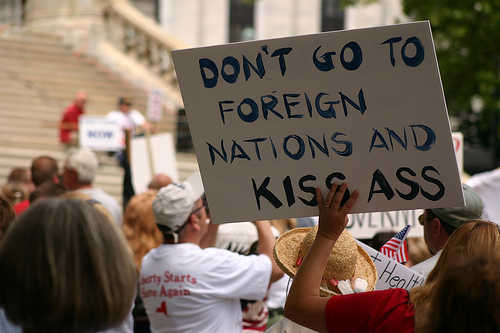
The results of the latest Pew-CFR quadrennial survey of public and elite attitudes on foreign policy are startling not only for the gap between public and elite attitudes on international security, but also for the types of concerns held by the average American. Simply, Americans feel scared, wary, and alone.
As reflected in President Obama’s West Point speech about the Afghan strategy, al Qaeda and terrorism are at the forefront of Americans’ security concerns. 67 percent of Americans feel that al Qaeda has the same or greater capabilities as they did on September 11, 2001. This despite the reality that we’re fragmenting the organization, prioritizing homeland security, and partnering with a record number of countries to conduct counter-terrorism. The near success of the Christmas 2009 plot seemed to give credence to the opinion, which was measured before the Nigerian’s attempted attack.
When it comes to terrorism, the public view is likely to dictate American policy. We saw a preview of this when the administration quickly changed course from DHS Secretary Janet Napolitano’s assessment that the counterterrorism system worked leading up to the Christmas Day attack. Being half right doesn’t count when it comes to counterterrorism and is reflected in Director of National Intelligence Dennis Blair’s testimony [PDF] last week. He told Congress there are serious flaws in how the intelligence community analyzes threat reporting and it must do better.
Given the salience of terrorism on Americans’ minds, another round of terrorist-driven intelligence reform, and an abundance of caution, it seems unlikely that the "war on terrorism" will easily fade from American foreign policy-making lexicon, as some had hoped a year ago.
In addition to terrorism, the American public increasingly feels threatened by China. A full 53 percent of Americans view China’s emergence as a world power as a major threat. At the same time, a plurality of 44 percent views China as the world’s leading economic power. This compares to just 27 percent who view the United States as the dominant economic power. This is undoubtedly based on the explosion of U.S. debt, the importance of China’s financing of the debt, and the emergence of China as a global trade partner.
These perceptions have made Americans increasingly wary of their role in the world. For the first time in 40 years of polling, the survey found a plurality of 49 percent that says the United States should “mind its own business internationally” and let other countries get along the best they can without help from Washington. This view seems based on understanding the limits of external actors to challenging security problems like counterinsurgency, disputed territories, and climate change. The overwhelming support for the Haitian people and the U.S. government’s leadership of relief efforts run against this view, but pending foreign policy crises that include Afghanistan, Pakistan, Iran, and North Korea can stunt any aggressive moves by the administration.
The poll is important for what it tells us of Americans’ views on security, but equally important at how different those views are from the foreign policy elites represented by Council on Foreign Relations members. In stark contrast to public opinion, the elites dismiss most of the average Americans’ concerns. For example, 86 percent of them dismiss the terrorist threat saying terrorists have the same or less capability than in 2001. Additionally, elites dismissed the China threat (only 21 percent view China as a threat), but also a majority anticipates that China will become an important ally of the United States.
The impact of threat perception is essential to anticipating future U.S. foreign policy. If public opinion is followed, we should expect to see more unilateral military action, divergence from international norms, and potentially more conflict. Fully 44% say that because the United States "is the most powerful nation in the world, we should go our own way in international matters, not worrying about whether other countries agree with us or not." Consequently, Americans support aggressive action against terrorists, think that Guantanamo Bay is important for American security, and do not think that international cooperation is as effective as unilateral action.
As the Obama administration wades into its second year, it will be forced to choose between a foreign policy elite consensus that sees more opportunities in the world and the public that increasingly feels scared, alone, and wary. When it comes to terrorism, China, and intervention, there is no middle course. The United States cannot sell weapons to Taiwan and develop China as an ally. The United States cannot assert itself as a global leader and “mind its own business” in international affairs. And the United States cannot protect U.S. jobs while supporting global economic integration.
Derek Reveron, an Atlantic Council contributing editor, is a professor of national security affairs at the U.S. Naval War College in Newport, Rhode Island. These views are his own. Photo by Flickr user Benny BNut under Creative Commons license.
Image: tea-party-kiss-ass.jpg
